|
Paola Sapienza and Luigi Zingales1
July 13, 2009 - A sense of optimism and a reduction in fear and anger toward America’s financial institutions mark the latest findings in the Chicago Booth/Kellogg School Financial Trust Index. According to the report, trust in financial institutions has gone up slightly in the last three months, especially toward banks and government intervention in financial markets.
The researchers found that from March to June 2009, the Financial Trust Index has increased slightly from 19 percent to 21 percent. Most notably, the researchers report a jump in trust toward banks and bankers, from 29 percent in March 2009 to 34 percent in June 2009.
FINANCIAL TRUST INDEX: KEY FINDINGS
Seeking to formalize the relationship between trust and finance, Sapienza and Zingales analyzed data from more than 1,000 American households, randomly chosen and surveyed via phone during two weeks in late June 2009 2.
Average response on a scale from 1 to 5 to the question, “How much do you trust …” where 1 means “I do not trust at all” and 5 means “I trust completely.” |
 |
|
| |
Stock Market
The researchers reported that trust in the stock market has stabilized. In the last six months, the fear of a large drop in the S& P (specifically, a 30 percent drop) is significantly reduced to 46 percent in June 2009, from 56 percent in December 2008. And, the percentage of survey respondents who think the market is undervalued fell by nine percent since March, while the number of people who think the stock market is overvalued did not increase.
Respondents were asked, “In the next few months are you planning to … your investment in the stock market?” |
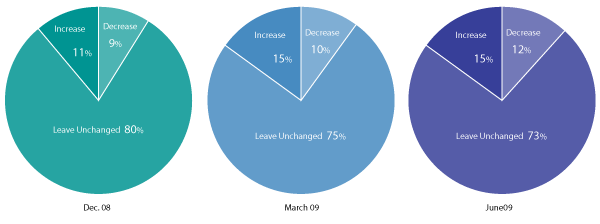 |
|
| |
Respondents were asked, “In your opinion, what is the likelihood that the stock market will drop by more than 30 percent in the next 12 months?” |
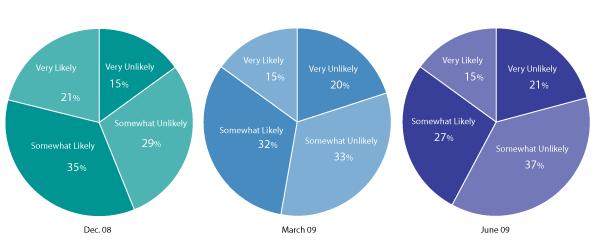 |
|
| |
Housing Market
Sapienza and Zingales report significantly more optimism on the housing front. The percentage of people who think house prices in their area will decrease in the next year has dropped to 26 percent in June 2009, from 37 percent in March and 47 percent in December 2008.
“In only six months we’ve seen marked improvement in confidence toward home values. In fact, 75 percent of the people who changed their opinion during this time period now think house prices will remain stable, while the remaining fourth think house prices will rise,” said Sapienza.
Respondents were asked, “In the next 12 months do you think house prices in your area will drop?” |
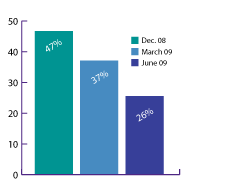 |
|
| |
Government Intervention
The June 2009 results demonstrate that government intervention still makes 62 percent of Americans less confident in investing in financial markets. However, this is a considerable change from 80 percent who felt less confident in December 2008 and 67 percent in March 2009. This improvement affects Republicans, Democrats and Independents equally, Zingales noted.
“Overall we’ve seen a strong increase in trust toward the government across the board—11 percentage points between December 2008 and June 2009,” said Zingales.
Respondents were asked, “Have the government interventions in financial markets over the last three months made you more or less confident in investing in the stock market?” |
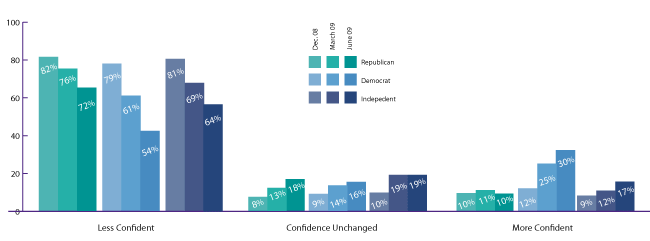 |
|
| |
Jobs
Of all the data collected in this issue, the only negative uncovered was related to the prospect of losing a job. The researchers reported a median rise from one percent in December 2008 to five percent in June 2009 (mean rises from 24 percent in December 2008 to 26 percent in June 2009) in the perceived probability of becoming unemployed.
“Layoffs and jobless claims have continued to make headlines in the last three months, and as a result Americans are still feeling uncertain about their job security,” said Sapienza.
Respondents were asked, “What do you think are the chances that you will lose your job during the next 12 months?” |
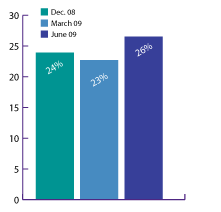 |
|
| |
Anger about Economic Situation
While Americans were still feeling angry toward the situation in March 2009 (41 percent), the percentage of people harboring anger dropped to 29 percent in June 2009.
Respondents were asked, “How angry are you at the current situation?” |
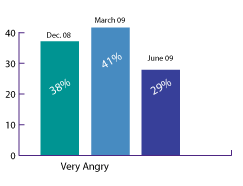 |
|
| |
1 Paola Sapienza is a Professor of Finance at the Kellogg School of Management at Northwestern University and Luigi Zingales is the Robert McCormack Professor of entrepreneurship and finance at the University of Chicago Booth School of Business.
2 The survey was conducted using ICR's weekly telephone omnibus service. It used a fully replicated, stratified, single-stage random-digit-dialing sample of landline telephone households |







